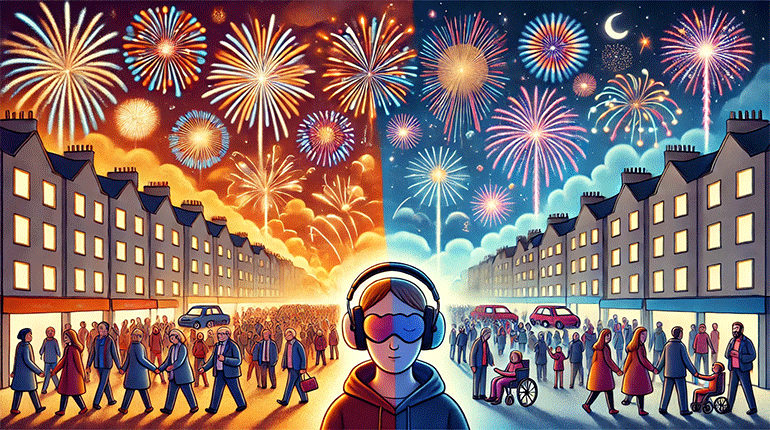The Impact of Bonfire Night on Individuals with Autism
Bonfire Night, celebrated annually on November 5th, is a cherished tradition across the UK, filled with dazzling fireworks, roaring bonfires, and lively gatherings. While these festivities bring joy to many, they can present significant challenges for individuals with autism due to sensory sensitivities, changes in routine, and social pressures.
Sensory Overload
Noise Sensitivity
The loud, unpredictable bangs of fireworks and the constant hum of excited crowds can be overwhelming for individuals with heightened auditory sensitivity. For some, this may lead to feelings of anxiety or even physical discomfort.
Visual Stimuli
The bright flashes and erratic bursts of fireworks, coupled with the glow of bonfires, can be visually overstimulating. This sensory input may result in discomfort or sensory overload, causing distress.
Changes in Routine
Disruption
Bonfire Night often alters typical evening routines, which can be unsettling for individuals with autism. The reliance on structure and predictability means that deviations from their daily schedule can provoke unease or frustration.
Unpredictability
The sporadic nature of fireworks and the lack of a clear timeline for events can exacerbate feelings of stress. Without knowing what to expect, individuals may struggle to adapt to the situation.
Social Interactions
Crowds
Large gatherings and bustling environments can induce social anxiety for those who find it challenging to navigate complex social settings. The noise and movement of crowds can add to the difficulty.
Communication Challenges
Amid the chaos of Bonfire Night, expressing needs or feelings may become a daunting task. The noisy backdrop makes verbal communication harder, potentially leaving individuals feeling isolated.
Strategies for Inclusion
To create a more inclusive Bonfire Night experience, consider these thoughtful strategies:
Noise-Cancelling Headphones
These can significantly reduce the impact of loud sounds, enabling individuals to enjoy the festivities without overwhelming noise.
Designated Quiet Areas
Providing calm spaces where people can retreat when overstimulated is crucial. These areas offer a sanctuary for relaxation and recovery during the event.
Clear Schedules
Sharing a detailed event timeline can reduce anxiety by providing a sense of predictability. Visual aids or social stories can further support understanding of the event flow.
Smaller Gatherings
Hosting smaller, autism-friendly celebrations with fewer sensory triggers can make the experience more enjoyable and accessible.
Community Awareness
Encouraging awareness and understanding among attendees fosters a supportive environment where individuals with autism feel respected and included.
Toward an Inclusive Bonfire Night
With the right accommodations and empathy, Bonfire Night can become an occasion that everyone, including individuals with autism, can enjoy. By addressing sensory needs, promoting predictability, and fostering inclusion, we can ensure that this beloved tradition is welcoming to all.


